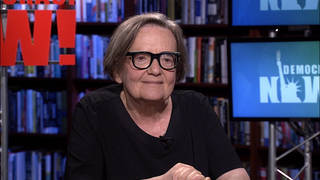
Guests
- Philippe Legrainauthor of European Spring: Why Our Economies and Politics are in a Mess—and How to Put Them Right. He served as economic adviser to the president of the European Commission from 2011 to 2014. He recently published a piece for The New York Times titled “Open Up, Europe! Let Migrants In.”
Under a new European Commission proposal, quotas would be set for all 22 nations across Europe to take in a total of 160,000 refugees. Germany, which supports quotas, has already said it can accept half a million refugees each year. Many other European nations — including Hungary, the Czech Republic, Slovakia and Poland — have opposed a compulsory system. We speak to former European Commission adviser Philippe Legrain, who recently wrote a piece titled “Open Up, Europe! Let Migrants In” on how Europe could benefit from an influx of refugees.
Transcript
JUAN GONZÁLEZ: “Open up, Europe! Let Migrants In.” That’s the name of a recent New York Times article by our next guest, Philippe Legrain. He served as an economic adviser to the president of the European Commission from 2011 to 2014. He’s the author of European Spring: Why Our Economies and Politics are in a Mess—and How to Put Them Right.
AMY GOODMAN: Philippe Legrain joins us now from London.
Welcome to Democracy Now! Talk about what you’ve proposed, what you see Britain doing, where you live, what you see the European Union doing, and what they should be doing.
PHILIPPE LEGRAIN: Well, I mean, clearly, at the moment, there is a moral panic in Europe about the new arrivals, unwanted new arrivals, and notably refugees from Syria, Afghanistan and Eritrea. And basically, the prevailing wisdom is that these newcomers are a threat, that they’re going to drag society down, and that they’re going to be a cost to the economy and to taxpayers. And I think that’s incorrect. So I think that you need to make an argument first that it’s Europe’s humanitarian duty to allow in refugees. And in that respect, the debate has been shifting since those tragic pictures of a Syrian child washed up on a Turkish beach. But in the other aspect, which is that this is actually a benefit to Europe and not a cost, I think there’s still a long way to go. The narrative is still prevailing that somehow refugees are a burden that need to be shed out.
You need to see the context, which is that Europe’s working-age population is shrinking by around a million people a year, while the number of pensioners is increasing by about 2 million. So, Europe needs young workers to do jobs that need doing, to pay taxes, to help pay for the pensions and healthcare and social care of the growing ranks of elderly people, to help care for those people, to start businesses which in turn create jobs, and to innovate. So, in all sorts of ways, migrants have a lot to contribute to Europe, and we ought to be having a positive narrative about that, looking at it as an opportunity rather than as a threat.
JUAN GONZÁLEZ: Well, and, Philippe Legrain, the United States confronted a similar crisis back in 1980, when over a few-week period about 125,000 Cubans came to Florida shores in the Mariel boatlift, and that created enormous debate across the country. Some argue it helped Ronald Reagan win the presidential race against Jimmy Carter, who opened up our country to the Mariel refugees. Your sense of the political debate going on in Europe now and the impact it could have depending on how some of these governments decide whether they’re going to open up their borders to the refugees?
PHILIPPE LEGRAIN: Sure. I mean, the first point to make is about numbers. Clearly, you see very vivid TV pictures of seemingly large numbers of people on the move. And yet the 340,000 people who have entered Europe without permission since the start of the year are equivalent to 0.07 percent of Europe’s population. So the idea that somehow this is going to overturn society or somehow be an impossible disruption is simply not true. It’s actually a relatively small number. In a crowd of 1,500 people, only one of them would be an unwanted new arrival.
In terms of the political impact, of course, you know, there is a rise of—long before this crisis, of far-right, populist, xenophobic and racist parties, who sound a lot like Donald Trump does in the U.S. And they are making hay out of this crisis and arguing, as indeed does the prime minister of Hungary, that somehow the refugees are a threat to Christianity, civilization, law and order, a burden on the welfare state and so on. I think that Chancellor Merkel is to be commended that so far she is ignoring the voices who are telling her to take a hard line, and that even those governments which have been much more skeptical have been forced by public opinion to make a more constructive approach. So you see in my own country, Britain, the prime minister, initially dead set against letting in Syrian refugees, now has announced a relatively small program, but still it’s a step forward, of allowing in 20,000 Syrian refugees over the next five years. I think also the United States needs to do more. The United States has allowed in only 1,500 Syrian refugees, and that really is a drop in the ocean. And I think this is not just a matter for Europe, it’s a matter also for the United States.














Media Options